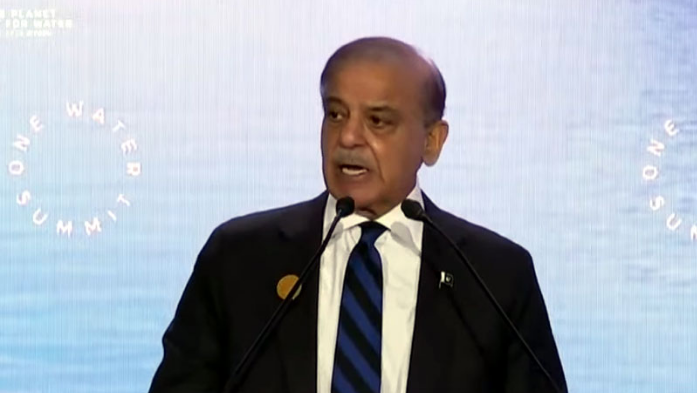Riyadh (Web Desk): Prime Minister Shehbaz Sharif on Tuesday said that overcoming the water crisis requires not only strong political will but also effective global leadership, given the growing threat it poses to nations worldwide.
Addressing the "One Water Summit" in Riyadh, he underlined the need for international cooperation and collaboration to ensure the availability and sustainable management of water and sanitation for all.
Speaking to an international audience, PM Shehbaz acknowledged the significance of water as the foundation of life, economic progress, food security, and environmental sustainability.
However, he warned that water is increasingly under threat as it faces mounting pressures from pollution, depletion, and scarcity.
“Almost half of the world’s population is already struggling with water shortages at some point throughout the year, and many communities still lack access to safe drinking water,” the premier said, highlighting that this growing crisis is linked to climate change and increasing pollution, which is contaminating water resources at alarming rates.
The prime minister also pointed out that the challenges are not only theoretical but real and urgent.
“Water resources, including rivers, glaciers, and aquifers, are rapidly diminishing, displacing millions of people and causing widespread destruction,” PM Shehbaz said, adding that these challenges are not a distant threat but an immediate call for action.
He said that Pakistan is particularly vulnerable experiencing the combined impact of devastating floods and prolonged droughts.
“In 2022, Pakistan faced catastrophic flooding that caused widespread damage to infrastructure and communities, severely affecting its water resources and irrigation systems. At the same time, large parts of the country are at constant risk of drought due to the arid nature of the land and rising temperatures,” PM Shehbaz said.
The premier highlighted that such extreme weather events are expected to intensify if no action is taken on a global scale.
“Pakistan is one of the countries most at risk from climate change, with rising temperatures projected to exceed the global average,” PM Shehbaz warned.
Against this backdrop, he reiterated the importance of international collaboration in addressing water scarcity, emphasizing the need for a unified approach to prevent further damage.
PM Shehbaz also focused on the critical importance of cooperation between nations when it comes to managing transboundary water resources.
Water, he explained, transcends borders and connects nations, making it essential to foster shared understanding and cooperation.
He pointed to the Indus Water Treaty, which governs the sharing of water from the Indus River Basin, as a prime example of how effective collaboration can ensure the sustainable use of water resources.
However, he acknowledged that the treaty has faced numerous challenges in recent years, particularly due to the construction of upstream dams.
Despite these difficulties, the prime minister stressed that maintaining such agreements is vital for regional peace and stability.
On a domestic level, PM Shehbaz outlined Pakistan's efforts to address climate-induced water challenges, such as the "Recharge Pakistan" initiative, which seeks to mitigate the effects of floods and droughts through sustainable environmental practices.
He mentioned Pakistan's ongoing work on a National Drought Plan, which is designed to assess areas most at risk of drought and implement targeted solutions.
In his address, PM Shehbaz proposed a series of global initiatives aimed at tackling the water crisis.
His six-point agenda called for increased international cooperation, the sharing of knowledge and innovative technologies, and the development of climate-resilient infrastructure.
He also emphasized the need for greater investment in research, transparency, and the establishment of frameworks that promote regional cooperation and avoid conflicts over shared water resources.
Above all, he argued, political leadership is essential to address the water crisis on both a national and global scale.
The prime minister also praised the efforts of Saudi Arabia’s Crown Prince Mohammad bin Salman in establishing the Global Water Organization, a significant step toward unifying international efforts to combat the water crisis. He expressed Pakistan's commitment to supporting the initiative and contributing to its goals.
In conclusion, Sharif reflected on his personal memories of childhood, recalling scenes of children playing along the rivers in Lahore and the fishermen working along the banks of the River Ravi. These images, he noted, serve as a poignant reminder of what is at stake.
As stewards of the future, PM Shehbaz urged global leaders to ensure that future generations can continue to rely on the rivers, lakes, and aquifers that have sustained civilizations for centuries, warning that without collective action, these vital resources could be lost forever.


